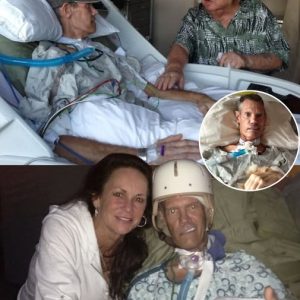The call came in at 9:30 p.m., right as I was settling my youngest into bed. Dispatch reported that a child had dialed 911 but didn’t speak. They traced the call to a modest home just a few streets away.
When I arrived and knocked, the door creaked open. A barefoot boy in pajama shorts stood there, clutching a phone like it was a lifeline. His eyes held a mix of anxiety and quiet determination. Without prompting, he said, “I’m hungry. We haven’t eaten all day.”
My heart sank.
He said it like a fact, not a complaint. Just a truth he had grown used to. He told me his name was Mateo. Only he and his sister were home. She was asleep in the back room.
I asked where their parents were. He just shrugged and looked at the floor.
The place was clean, but hauntingly bare. No pots simmering on the stove. No boxes of cereal on the counter. I opened the fridge: a few ketchup packets and an old jug of milk. Nothing else.
I knelt to his level. “Can I take a picture with you?” I asked gently. “Just for me. To remember this moment.”
He looked confused, then smiled—for the first time that night.
I didn’t call backup to arrest anyone. I called to bring food. I didn’t know what I’d walked into, but I knew I wasn’t walking away.
While we waited, I sat with him. Mateo said he was eight. His sister Sofia was five. Their mom worked two jobs and sometimes didn’t come home at night, though she always left food. But tonight, there was nothing—not even a spoonful of peanut butter left.
Mateo had put Sofia to sleep earlier. He was used to doing that, he said. He gave her whatever food they had first. But tonight, they both went without.
Sirens echoed in the distance. Paramedic Rosa showed up moments later, drawn by the same dispatch alert. Word travels fast among first responders. She carried a brown paper bag stuffed with sandwiches, juice boxes, and two emergency granola bars.
“You must be starving,” Rosa said softly, offering Mateo a sandwich wrapped in foil. He nodded but didn’t eat right away. Instead, he gently placed the sandwich aside.
“I should wake Sofia,” he whispered.
“No need,” Rosa replied, sliding a second sandwich next to the first. “She can eat in the morning. You go ahead.”
Mateo sat down. For the first time, he allowed himself to pause. He unwrapped the sandwich and took a careful bite. And with that bite, a visible shift occurred. His shoulders relaxed. His eyes softened. It was like he’d been holding his breath all day.
Rosa and I exchanged a glance. We both knew we couldn’t leave—not tonight. Not with so many questions unanswered.
“I’ll stay with them until Social Services arrives,” Rosa said quietly. “You find their mom.”
Her words felt like a kick in the chest. I knew she was right, but I also saw the flicker of fear in Mateo’s eyes when we mentioned calling for help.
“Let me try reaching her first,” I said. “If she doesn’t answer, we’ll go from there.”
That gave Mateo hope. “She works at Joe’s Diner,” he said between bites. “She can’t use her phone at work.”
I radioed for someone to check the diner.
Twenty minutes later, dispatch confirmed she was there—frantic, tearful. She’d realized too late that she’d left her phone at home. She’d rushed to close the shift, unable to check on her kids. When she learned they were safe, she cried with relief and asked to speak with them immediately.
Mateo lit up as soon as he heard her voice. His words spilled out in a joyful rush, telling her about the sandwiches, the visitors, and that everything was okay. It was all he needed—to hear her voice, to know she hadn’t forgotten him.
When she arrived, Social Services decided not to intervene. Instead, they connected her with local food banks and support programs. Before Rosa left, she gave her a flyer for community meals and family aid.
That night could have gone so differently. I still think about the way Mateo held that sandwich—like it was the most precious thing in the world. It reminded me how fragile things are for families living paycheck to paycheck. How a single missed shift or forgotten phone can send a child into survival mode.
Two weeks later, Rosa visited the station out of uniform, wearing jeans and a bright yellow sweater. She brought cookies and a spark in her eyes.
“I couldn’t stop thinking about those kids,” she said. “So I did something.”
She launched Midnight Meals, a volunteer project connecting paramedics, nurses, and firefighters to families flagged by local schools. Every Friday, care packages were delivered—non-perishable food, school supplies, and handwritten notes of encouragement.
And people showed up.
Teachers donated books. Teens sorted donations. Store owners pitched in canned goods. The community bloomed around an idea born in one small kitchen.
Rosa invited me along on a delivery in December. As we pulled up to Mateo’s house, I braced for awkwardness. Would they remember us? Would they feel exposed?
Mateo answered the door smiling, fully dressed this time, and not hungry. He immediately recognized Rosa. His mom stood beside him, radiant with gratitude. Decorations filled the room. The kitchen table held a bowl of fruit, a loaf of bread, and a Midnight Meals box marked with a star.
Mateo proudly showed Rosa his school project. His joy was infectious.
Before we left, Rosa handed him a new backpack. His eyes shimmered. “Thank you,” he said softly. “For everything.”
Driving home, we didn’t say much. We didn’t need to.
That night reminded us why we do this work. Not for the big saves or loud emergencies—but for the quiet wins. The full fridge. The hug at the door. The boy who no longer goes to bed hungry.
Because sometimes, the smallest actions echo the loudest. A sandwich. A call. A moment of listening. You never know which one will change a life.




